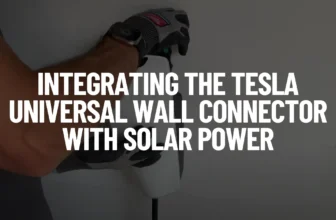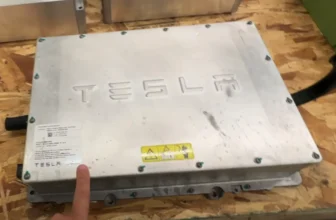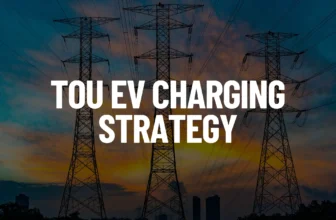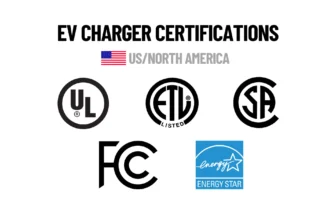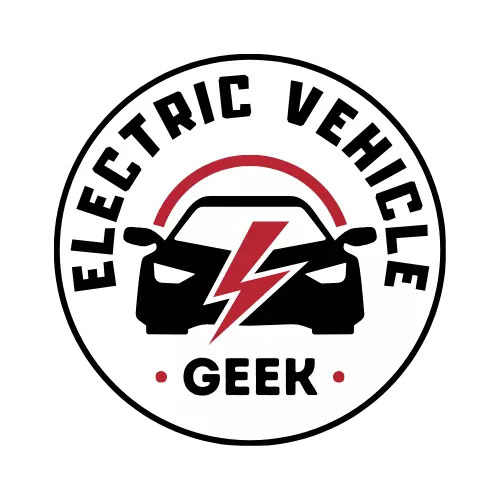My favorite and best EV charger Installation tools are based on years of residential and commercial EV charger installations, and feedback from countless other EV charger installers.
I’m not an EV charger installer who rushes into buying new tools, but having a core set of items (like a wire stripper and crimper combo tool) helps make EV charger installation easier by combining accurate wire stripping and secure crimping functions into one device eliminating the need for separate tools and saving time.
EV Charger Installation Tools Storage
Table of Contents
The EV charger installation tools listed here have been personally purchased and extensively tested in various home and commercial installations. Many of these tools are packed in my Welkinland electrician tool bag and Welkinland clear tool pouches, which I use to ensure that I have everything I need for EV charger installation, maintenance and repairs, upgrades and modifications, and inspections during consultation and compliance tasks.
Welkinland Electrician Tool Bag
The Welkinland tool bag is highly durable and designed for the rigorous demands of electrical work, featuring ample storage compartments to keep tools organized and easily accessible.
The ultimate electrician tool bag: Streamline your EV charger installations with easy organization, protection, transport, and access!
Welkinland Clear Tool Pouches
The Welkinland clear tool pouches are perfect for quick identification of small parts and accessories, saving valuable time on the job.
See It, Grab It, Get It Done: Enjoy effortless visibility, instant access, and organized storage for your essential EV charger installation tools
With your electrician bag and pouches ready to store your EV charger installation tools, you’ll be equipped for every stage of the process. These top tools are essential for everything from installation and maintenance to upgrades, modifications, and inspections. Whether you’re a professional installer or a DIY enthusiast, these tools will help ensure precision and efficiency in your work.
The Best EV Charger Installation Tools I Use
I use and highly recommend all the EV charger installation tools on this list. Based on my descriptions, choose the tools that best fit your needs. I have no affiliation with these brands; I’m just sharing the tools I trust and use with fellow EV charger installers.
Essential Tools for EV Charger Installation
Basic Hand Tools
Insulated Screwdriver Set
What I own and love: Wiha Insulated Screwdriver Set
Quantity Recommended: 1 Set
When installing EV chargers, especially for high-powered electrical vehicle branch circuit installations, having the right screwdrivers is crucial. I use the Wiha Insulated Screwdriver Set for this purpose due to its reliable protection against electrical shocks and its durability for various tasks.
This versatile set handles various tasks such as attaching and removing EV charger outlets, mounting and wiring circuit breakers, and repairing electrical panels. It’s also ideal for installing and securing electrical and junction boxes, and cover plates, and for the precise assembly and disassembly of EV charger components during maintenance. The combination of safety features and versatility makes the Wiha Insulated Screwdriver Set a standout choice for managing complex electrical tasks confidently.
While Wiha provides excellent value, other brands like Klein and Irazola are also well-regarded but come at a higher price point. Overall, the Wiha Insulated Screwdriver Set offers exceptional quality and safety, making it a smart investment for EV charger installers.
Wrenches (Adjustable and Socket)
Quantity Recommended: 4 Sets
Over the last few years, I have accumulated a total of four wrenches for my EV charger installations, three of the wrenches are adjustable wrenches while one of the wrenches is a special non-conductive wrench.
Adjustable Wrench
Quantity Recommended: 3 Sets
I have three adjustable wrench sets that I recommend for purchase by professional EV charger installers:
The first one is an open-end wrench set that is normally U-shaped and is ideal for turning nuts and bolts in tight places, they are mostly used to tighten or loosen bolts on mounting brackets or connectors where space is limited such as solar panel mounts, renewable energy sources, batteries storage terminals, and other accessories that are secured by bolts and nuts.
The second adjustable wrench set that I own is a box-end wrench set, The closed loop design of box-end wrenches provides a secure grip on fasteners, which is important when working with components that require a precise and firm connection, such as securing electrical terminals or connectors in the EV charger.
The third wrench set that I own is a set of combination wrenches, These wrenches offer flexibility by combining the features of both open-end and box-end wrenches. They can be used for various tasks, such as adjusting or securing different parts of the EV charger installation, from mounting hardware to securing conduit fittings.
Non-Conductive Handle Wrenches
The last type of wrench that I recommend for repairs, maintenance, and inspection are Non-conductive handle wrenches, Non-conductive handle wrenches are crucial when working with live electrical vehicle branch circuits.
They are designed to prevent electrical shocks, making them essential for handling live components or wiring during installation, repair, maintenance, or inspection processes. Using these wrenches helps ensure safety by reducing the risk of accidental electric shock while working on or around energized parts of the EV charger system.
Pliers
What I own and love: DOWELL Pliers Set
Quantity Recommended: 1 Set
For every EV charger installer, a comprehensive set of pliers is indispensable. I opt for the Dowell 6-Piece Pliers Set for its quality and versatility. Here’s how each tool contributes to an efficient installation:
- 10-inch Groove Joint Pliers: I use it for gripping and turning larger components like conduit fittings and electrical boxes. The adjustable jaws handle various sizes, ensuring secure connections for EV charger installations.
- 8-inch Adjustable Wrench: I use it for tightening and loosening nuts and bolts in EV charger mounting and wiring. Its adjustable jaw fits different fasteners, providing versatility for various components.
- 8-inch Linesman/Combination Pliers: I find the 8-inch linesman/combination pliers Perfect for gripping, twisting, and cutting wires. These pliers are crucial for handling and connecting electrical wires, a key task in configuring EV chargers.
- 8-inch Locking Pliers: These are the perfect pliers I use for clamping and securing components during installation. The locking mechanism provides a firm grip, stabilizing parts for precise adjustments.
- 6-inch Needle Nose Pliers: When working on tight paces I use the 6-inch needle nose pliers for their long, pointed tips designed for precision work in tight spaces. They are excellent for bending and manipulating small wires and connections in complex EV charger setups.
- 6-inch Diagonal Side Cutting Pliers: I use the 6-inch diagonal side cutting pliers for cleanly cutting EV charger installation wires and cables. Their angled cutting edges ensure neat and effective trimming of wires flush against connectors or surfaces.
This is the perfect pliers set for EV charger installers, that will help me from component securing to precise wire manipulation and cutting.
Wire Stripper and Crimper.
What I own and love: KATA Wire Stripper, Wire Cutters, Crimper Tool
Quantity Recommended: 1
Another accessory that is a must-use in EV charger installations is a wire stripper, the tool is used to strip sheathing from EV charger installation wires to expose the copper wire and make connections with other wires or EV charger installation accessories.
I use a KATA wire stripper, cutter, and crimper tool to cut, strip, and crimp EV charger installation wires, the tool is perfect for most home EV charger installations and supports 4-10 AWG wires which are commonly used in Level 1 and Level 2 EV charger installations.
Tape Measure
What I own and love: Milwaukee 25 ft. Magnetic Tape Measure
Quantity Recommended: 2
When installing EV chargers it’s essential to know the measurements of wires and EV charger installation equipment such as the distance from the floor to the NEMA outlet for plug-in EV chargers and the distance to the junction box of hardwired EV chargers.
I carry two Milwaukee 25 ft. Magnetic Tape Measures to every EV charger installation site. One is always in my tool belt for quick access, while the other stays in my toolbox as a backup. Tape measures are essential, and having multiples ensures you always have one ready for use.
The Milwaukee tape measure’s rugged design is ideal for outdoor installations, and its longer 25 ft. blade outperforms competitors like Dewalt. The magnetic tips also simplify single-person installations by allowing easy attachment to magnetic accessories such as electrical panels, junction boxes, outlets, and subpanels.
Electrical Tape.
What I own and love: 3M Temflex Vinyl Electrical Tape
Quantity Recommended: 10
You will need high-quality electrical tape to insulate wires and other EV charger installation accessories in your circuit, and since there is a high voltage current in the circuit which might heat the installation wires during EV charging I prefer using Flame Retardant to prevent electrical fires, especially on my connections which are mostly left uninsulated and prone to contamination unless wrapped 3-4 times.
I buy in bulk 10 pieces of 3M Temflex Vinyl Electrical Tapes which not only saves me time but also the need to re-order additional electrical tapes after every use, most of the time I spend a roll of tape per site, it may be due to my strict 4 wraps and I’m mostly called to install complex EV charger installations with multiple connections requires.
The 7 mil thick Temflex tape is ideal for outdoor and indoor EV charger installations, It is comfortable for EV charger outdoor installations and is rated to handle 19F (-7C) and during thermal runaway, the tape can handle up to 194F (90C) making it an ideal tape for residential EV charger installations.
Level
What I own and love: Klein Tools Torpedo Level
Quantity Recommended: 1
When installing hardwired components for EV chargers, such as circuit breakers, outlets, junction boxes, electrical panels, and security boxes, achieving the correct placement and level is crucial for both the aesthetics and the secure installation of your system.
I rely on the Klein Tools Torpedo Level, which offers leveling angles of 0°, 30°, 45°, and 90°—the most commonly used angles for electrical installations. For instance, I use the 0° setting for installing electrical panels and circuit breakers, while the 90° setting is ideal for mounting EV chargers and placing conduits. This precision ensures a professional and secure installation every time.
Wire and Cable Lugs
What I own and love: TKDMR Copper Wire Lugs
Quantity Recommended: 20 Pcs
I rely on TKDMR copper wire lugs for connecting copper wires in my EV charger installations to key components like grounding terminals, electrical panels, and other accessories.
For a typical home EV charger installation, I ensure I have at least 20 pieces on hand to connect the wiring to the necessary accessories. These lugs offer a more secure and reliable connection compared to crimp connectors, which is essential for ensuring the safety and durability of the installation.
Fish Tape
What I own and love: Klein Tools 50-Foot Electrical Fish Tape
No products found.
Quantity Recommended: 1
One essential tool for EV charger installations is fish tape, which is used to run wiring from the electrical panel to outlets or junction boxes through the installation conduits.
I prefer the 50ft Klein Tools steel fish tape for its durability and effectiveness in pulling wires through conduits. Its steel construction makes it tough enough to handle multiple wires or heavier gauges, and it’s housed in a retractable coil for easy storage and use. The tape also features a hook at the end, allowing for secure attachment of wires during the pull, making it an invaluable tool in ensuring efficient and precise installations.
For most EV charger conduit installations, a 50ft length is typically sufficient, even when extending the installation to the point of use. I’ve found that 50ft meets most needs, as running long strands of wire without incorporating junction boxes (to break up the run) is generally not recommended due to potential voltage drops. This ensures optimal performance and safety of the EV charger circuit wiring.
Terminal Blocks
What I own and love: Blue Sea Systems terminal blocks
Quantity Recommended: 21 (different circuits and amps configurations)
During the inspection of an EV charger installation, it’s important to determine the number of terminal blocks required to group multiple wires depending on the complexity of the EV charger installation, we also recommend making sure you have included terminal blocks to be used for EV charger grounding in case of multiple grounding, there are some instances you will need to connect emergency switches that also might require terminal blocks to group hot wires together.
Even with quotations made and terminal blocks bought, I make sure to include my terminal blocks in my electrical toolbox just in case I need them, I pack Blue Sea Systems terminal blocks in different circuit and size configurations.
Utility Knife/Electric Knife
What I own and love: Klein Tools Utility Knife
Quantity Recommended: 1
Utility knives are extremely handy, they help in cutting EV charger installation wires and cables, cutting electrical tape and insulation without damaging the core wire, and opening boxes that carry EV charger installation accessories, I use Klein Tools Utility Knife which is a hawkbill blade shape that is good for pullback cutting and slicing through thicker cables especially when installing smart home chargers and commercial EV chargers that require heavily sized wire gauge.
While other electrician knives, like those from Milwaukee and Knipex, are available, I find that the rubberized grip of the Klein Tools Utility Knife significantly reduces hand fatigue and enhances comfort, control, and safety during prolonged EV charger installations by minimizing slip, vibration, and strain.
Power Tools
Power Drill
What I own and love: DEWALT 20V Max Cordless Drill
Quantity Recommended: 1
When it comes to power drills, I prefer cordless models, particularly for EV charger installations. Since we often need to shut off power to the home or specific circuits for safety reasons, a corded drill isn’t practical or safe for high-power installations.
I rely on the DEWALT 20V Max cordless drill, which has proven invaluable in these scenarios. It not only allows me to work efficiently with the power down, but it also speeds up the assembly and disassembly of EV charger components, making it easier to access wiring and other critical parts during installation, repair, and maintenance.
Electrical Tools
Circuit Analyzer
What I own and love: Klein Tools Circuit Analyzer
Quantity Recommended: 1
For installing EV chargers, maintenance, and repairs the Klein Tools Circuit Analyzer is essential. This handheld device helps diagnose electrical issues and verify EV charger installation circuit functionality.
I use the analyzer to identify wiring issues such as open or short circuits, miswires, and grounding problems. It ensures that EV charger outlets and circuit breakers are correctly wired and that the installation circuit functions properly. Additionally, it quickly and accurately measures voltage, polarity, line voltage, phase reversals, and other critical parameters, providing comprehensive diagnostics in seconds.
I use the Klein Tools Circuit Analyzer to extend home electrical panels to subpanels in EV charger installations. Its precision and user-friendly interface are ideal for testing multiple connections, including various EV charger installations and renewable energy-integrated setups such as solar-powered systems. The analyzer delivers clear readings and real-time data, streamlining the troubleshooting and verification of electrical connections.

James Ndungu is a certified EV charger installer with over five years of experience in EVSE selection, permitting, and installation. He holds advanced credentials, including certification from the Electric Vehicle Infrastructure Training Program (EVITP) and specialized training in EV charging equipment and installation, as well as diplomas in EV Technology and Engineering Fundamentals of EVs. Since 2021, James has tested dozens of EV chargers and accessories, sharing expert insights into the latest EV charging technologies.
Last update on 2026-03-01 / Affiliate links / Images from Amazon Product Advertising API
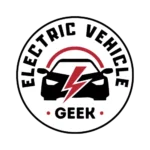

















![EV Charger Installation Tools [2026 Professional List]](https://electricvehiclegeek.com/wp-content/uploads/thumbs_dir/Best-Electric-Cars-Books-To-Read-Today-rcn5fgqi2plekwhhvnqycyw8tztowvtkuxm459olks.webp)
![EV Charger Installation Tools [2026 Professional List]](https://electricvehiclegeek.com/wp-content/uploads/thumbs_dir/Ford-Mustang-Mach-E-Chargers-Reviews-Featured-Image-rcn5fim6gdnz84erkok7hyf60rkfca11j6x33tlt8c.webp)
